TODAY IS THE FEAST DAY OF SAINT AIDAN OF LINDISFARNE...
Prayer of Saint Aidan
Amen.
MISSION STATEMENT ... To celebrate where it's deserved! ... To take the Michael out of institutions and individuals where it's deserved! ... Recently I had occasion to prepare my gravestone epitaph: GENE... Educator, Novelist, Humanitarian and Humorist - TO KNOW HIM WAS TO LOVE HIM - Rest in Peace ....... But while I am still walking the earth do not hesitate to contact me at: bobbyslingshot8@gmail.com
TODAY IS THE FEAST DAY OF SAINT AIDAN OF LINDISFARNE...
Amen.
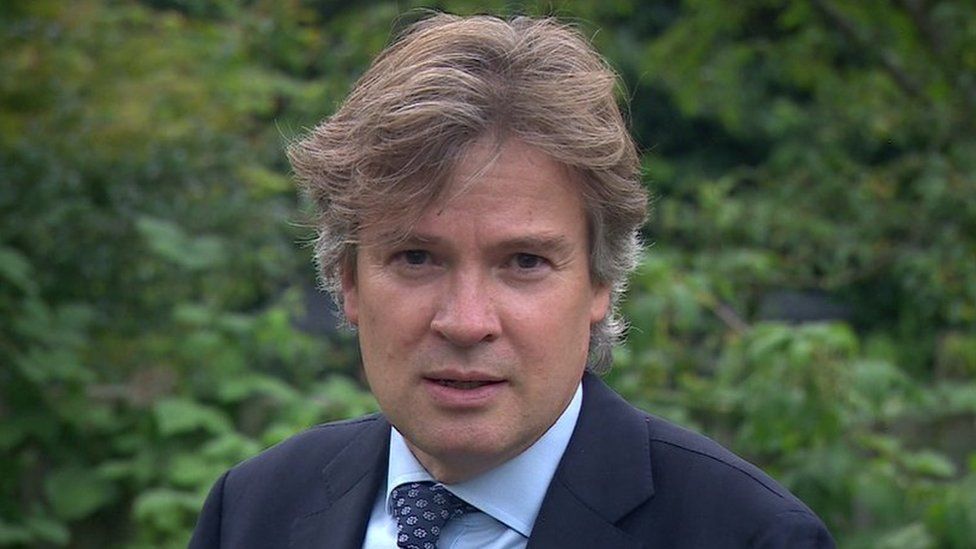
A group of anti-lockdown protesters has been sentenced after verbally abusing BBC journalist Nick Watt.
The Newsnight political editor was chased and called a traitor near Downing Street on 14 June 2021.
A large group had gathered at Westminster to protest against the government's extension of coronavirus restrictions in England by four weeks.
Four men and one woman had denied the charges but were found guilty at a trial earlier this month.
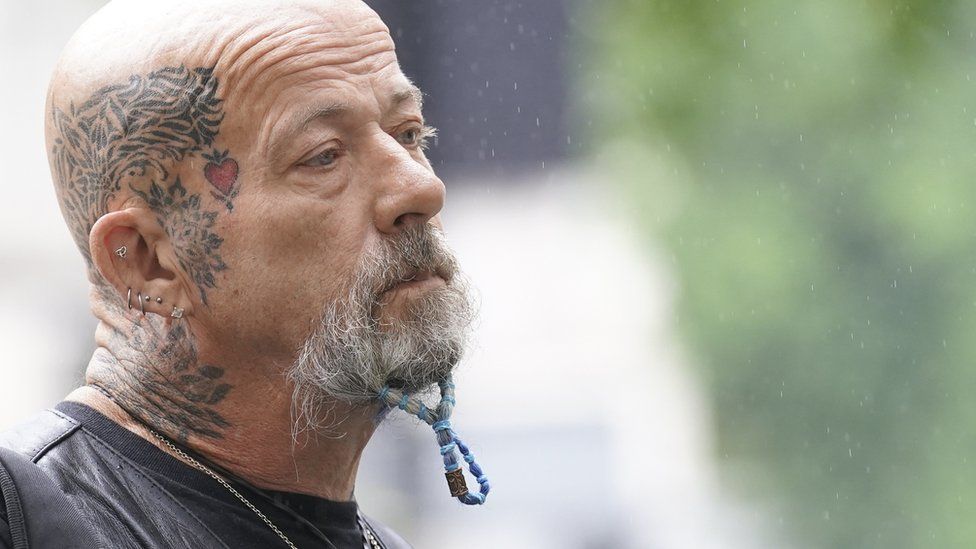 IMAGE SOURCE,PA MEDIA
IMAGE SOURCE,PA MEDIAEach had denied using threatening, abusive or insulting words or behaviour with intent to cause harassment, alarm or distress.
But footage shared on social media showed demonstrators shouting abuse in the face of Mr Watt, who was wearing a BBC lanyard.
Three men, Gary Purnell, 45, Alexander Peat, 34, and Martin Hockridge, 58, were handed 12-month community orders, with a requirement to carry out 200 hours of unpaid work.
Djazia Chaib-Eddour, 44, was given a 12-month community order, with a requirement to carry out 100 hours of unpaid work and 20 hours of rehabilitation.
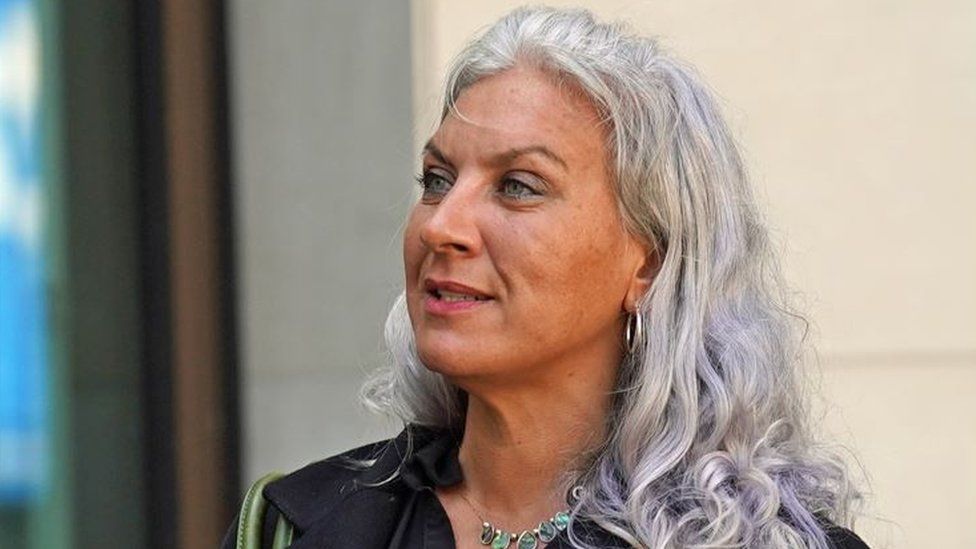 IMAGE SOURCE,PA MEDIA
IMAGE SOURCE,PA MEDIAThey were each ordered to pay a total of £395 in costs and other charges and given an indefinite restraining order not to contact Mr Watt.
District Judge Louisa Cieciora issued an arrest warrant for Christopher Aitken, 62, who did not attend the hearing at Westminster Magistrates' Court on Tuesday.
Prosecutor Sudara Weerasena said Mr Watt had faced further intimidation after attending court for the trial, and the prosecution barrister also needed a police escort.
"Having given evidence in this particular case, he was intimidated leaving the court," she said. "The prosecution advocate had to be escorted out of the building by police."
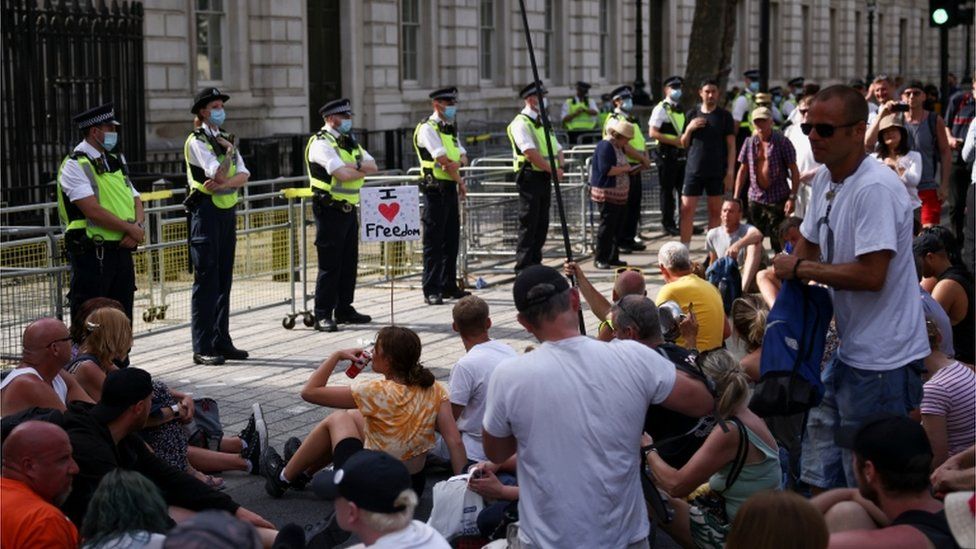 IMAGE SOURCE,REUTERS
IMAGE SOURCE,REUTERSBut Ms Cieciora said the allegations could not be "laid at the door of any of the defendants", who were still in court at the time.
"This was an extremely unpleasant incident in which each of you used abusive words and threatening behaviour towards Mr Watt," the judge said.
"This was committed against somebody who was providing a service to the public, even if you did not agree that service was being performed to the standard it should have been."
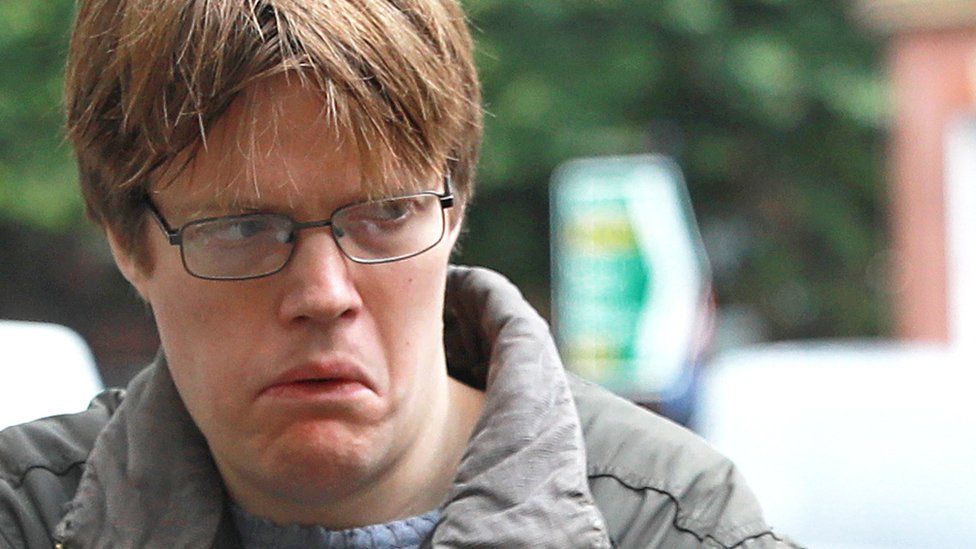 IMAGE SOURCE,PA MEDIA
IMAGE SOURCE,PA MEDIAIn a victim impact statement, Mr Watt told how he ran to the gates of Downing Street "as fast as I could" because of the "size and aggression of the crowd".
"At the time of the incident I was shocked and alarmed at what was happening to me," he said. "I felt I was in immense danger."
Mr Watt said he had been the subject of death threats on "conspiracy theorist forums" and had concerns "my safety can no longer be guaranteed".
"Whilst not from identified suspects in this case, they were clearly inspired by the incident," he said.
"My family and I found them very distressing."
‘Straight Pride’ march outside abortion clinic
clashes with 200 protesters
By
August 28, 2022 3:43pm
The National Straight Pride Coalition
marched outside an abortion clinic in California.REUTERS/Carlos Barria
A
march celebrating “straight pride” outside an abortion clinic in California
descended into violence as participants clashed with more than 200 pro-LGBTQ
and pro-choice counter-protesters, according to a report.
The
National Straight Pride Coalition, which organized the event, held for the
fourth consecutive year in Modesto on Saturday, described its cause as backing
heterosexuality, the “natural nuclear family,” Western civilization,
Caucasians, Christianity and nationalism.
The
handful of straight pride demonstrators were joined by members of the far-right
group Proud Boys outside a Planned Parenthood building ahead of the rally — and
were met by counter-protesters draped in rainbow flags and waving signs reading
“Fascists not welcome here,” the Modesto Bee reported.
The straight pride marches clashed
with counter-protesters draped in rainbow flags.REUTERS/Carlos Barria
Police
officers separated the rally-goers from the opponents across the street, but
physical conflict ensued when a Proud Boy attempted to bypass the cops, and
counter-protesters retaliated by chucking water bottles, the Bee reported.
A
firecracker reportedly went off, setting fire to a bush near the clinic and
filling the scene with smoke.
The
Modesto Police Department warned on
Facebook around 11:17 a.m. local time that there was “an unlawful assembly of
demonstrators along McHenry Avenue” and told people to stay clear of the area.
Police officers in tactical gear
fired pepper balls and bean bags.REUTERS/Carlos
·
I left my dream husband, house and job — now I’m gay, happy and
traveling
“We
have two armies to go up against when we stand for our rights: We have to deal
with the cops attacking us and we’re about to get a second wave of right-wing
extremists,” Odette Zapata, a counter-protester from Sacramento, told the Bee.
“We’re fearful of them attacking us as well.”
Three
people were arrested for “failure to disperse,” including one counter-protester
and two people affiliated with the straight pride rally, police spokesperson
Sharon Bear said, the Bee reported.
The
demonstration appeared to be over by 1 p.m. local time, leaving McHenry Avenue
littered with trash and debris from the clashes earlier in the day.
A
straight pride march organized by the same group last year similarly ended in
violence.
At
that event, members of the Proud Boys and other supporters of the group once
again clashed with counter-protesters outside the Modesto Planned Parenthood
facility on McHenry Avenue after about an hour of mostly avoiding each other.
A firecracker reportedly went off,
setting fire to a bush near the clinic and filling the scene with smoke.REUTERS/Carlos Barria
Modesto
police and staff from the Stanislaus County Sheriff’s Department were deployed
after a fight broke out and someone used bear spray, the Bee reported, and two
people were arrested on misdemeanor charges.
Chiropractor
Don Grundmann, founder and director of the group, previously told city council
members at a meeting ahead of the first straight pride march in
2019 that his organization was “a totally peacefully racist group,” prompting a
deafening roar of laughter and jeering from at least one local pol and many
audience members.
While he waited for his fiancée to come of age, his mistress (the mother of his son) left him for good because she was going to be ditched anyway in favor of a wife and her leaving caused Augustine heartbreak, "My heart still clung to her: it was pierced and wounded within me, and the wound drew blood from it." Nonetheless instead of waiting to get married, Augustine took a second mistress, and he later wrote, "By her my soul's disease would be fostered...not yet healed within me was that wound which had been made by the cutting away of my former companion."
Augustine's great friend, Alypius kept Augustine from getting married because he felt it would interfere with Augustine's quest for wisdom. Alypius had flirted with sex in early adolescence after which he had supplanted his sex drive with an insatiable desire for knowledge. He was chaste at a time when Augustine despaired of ever being chaste. Augustine later confessed that he played the role of the devil in the life of Alypius, because he taunted the younger man with the idea that he had only had sneaky, quick sex and thus he could not understand the lures of the flesh. While Augustine thought he could never be continent and while Alypius was happily in love with books and indifferent to sex, neither of them desired marriage, as Augustine made clear, "For whatever conjugal dignity there is in the duty of well-ordered marriage and in raising children, it attracted neither of us."
A deeper reading of The Confessions of St Augustine (which I've just done) informs as to the vicissitudes of Augustine's sexual addiction. His enslavement was enabled because he was owned by an error; he thought he could overcome his problem on his own, "I believed that continence lay within a man's own powers, and such powers I was not conscious of within myself." He had to discover that it is the Lord and the Lord alone who gives the gift for control over the sexual appetite, "I was so foolish that I did not know that, as it is written, no man can be continent unless You grant it to him." Augustine was referring to Wisdom 8:21, "And as I knew that I could not be otherwise continent, except God gave it, and this was also a point of wisdom to know whose gift it was."
Augustine asked for this grace, was given it so generously that he became totally chaste, which even to this day is an astounding testament to recovery from a very pernicious case of sex addiction.
We live in an age when sex addiction is largely treated by therapy, support groups and even rehab, if you can afford it. These may all be good and necessary, but they are part of the healing, they are not the Healer and no medicine can substitute for that which cured Augustine: asking the Lord for the gift to be chaste/in control of our sexual appetite. I've heard it said that sex addiction is not as fatal as other addictions, but here I really beg to differ. In my younger days, I was very close to someone who was an astonishingly alluring and influential person who had, ahem, plenty of offers. I soon discovered that they had quite a problem, however, and I became aware of a web of secrecy that shrouded a lifestyle which took large sums of money to maintain and involved making enemies of people who were too hurt (and used) to forget. All they while, they complained to me that they could not find a lasting love.
Their conscience was disabled and they felt nothing when they broke up a relationship and they were blithe and seemingly unaware of the injury they did themselves until they found a very willing partner who they did not know very well before becoming intimate - and that's when they discovered the person was brutally violent and capable of the worst. They survived, and it really was miraculous, but it caused me to think that if one percent of the population is psychopathic and if a sex addict loses all ability to judge the person who is inviting them home in the interest of getting their fix, then it really is only a matter of time before they meet the wrong person.
The person I knew did have a conversion and found a wonderful confessor, and they did as Augustine and asked for a special grace because even though they had been very deeply harmed, they would have otherwise gone back to that way of living when the wounds healed. And while our relationship had ups and downs, we later made amends and are on good terms now. I wish I'd had the maturity and life experience to help them when they were so direly addicted, but they really didn't respect me enough to listen, and I saw that it is the person who need ask for the gift from God to be in charge of their body, just as Augustine did.
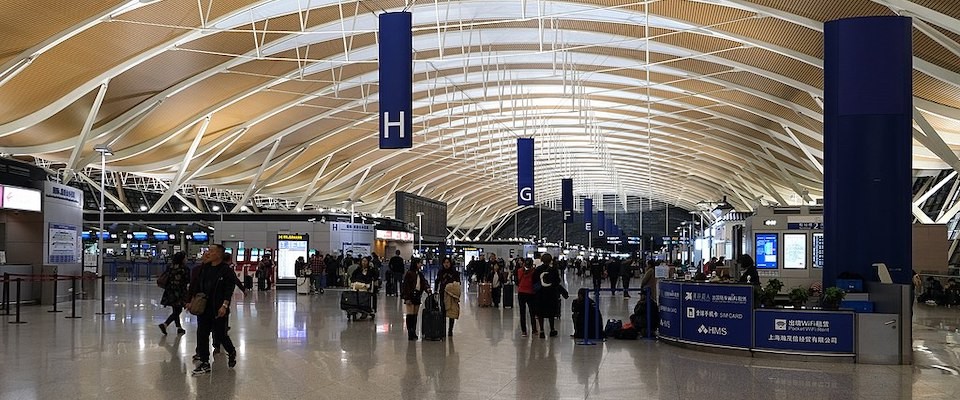
Reading a literary text in a certain type of physical space can make what was previously unintelligible come to life. Greek tragedies make more sense when you remember ancient theaters were built into sloping hills: The stories of grief and loss emerge against the “wild” backgrounds of sea or mountain valley, large, physical forces of nature that threaten to swallow up fragile, individual humans. Similarly, the rambling city of York was once the stage for the mystery cycle plays. A whole host of troops would follow a circuit through the city, performing their one little scene from sacred history, all the while in the shadow of the cathedral—just as human beings wander throughout history, groping for God. For Andrew Marvell, a formal garden, in which one enjoys that leisurely, time-slowed experience of order and variety, was the physical space most like a poem.
But the best place to read T. S. Eliot’s The Waste Land—in order to commemorate its one hundredth anniversary this year—is the airport.
The airport is a sacrament of modernity, an icon of power, control, efficiency, logistics, and smooth banality. It’s the placeless instrument by which millions of people, who don’t know one another, don’t want to know one another, nevertheless profitably use one another for a few hours to further advance their authenticity, somewhere else. At the same time, more than any other place in the world, our ordinary human actions—eating, talking, walking, waiting—are so completely confined to an arbitrary grid of order, it’s like a physical incarnation of despair. A few minutes there; a quick walk here; a well-placed utilitarian exchange there. Indeed, Houellebecq’s “inkling that, more and more, the whole world would come to resemble an airport” is haunting, because it’s a vision of a meaninglessness, placeless, communion-less world.
This is the context in which the peculiar horror of The Waste Land—a horror that comes from emptiness—makes sense.
One day this spring, I was preparing for a Humanities class I was teaching at Wyoming Catholic College, sitting on the filthy carpet in the airport, reading The Waste Land. That morning, I had been in San Diego; the afternoon was passed in snowy Denver; evening would be in colder Wyoming. As I sat there trying to read Eliot’s confusing poem, I couldn’t tune out the interminable sharp commands from TSA over the speakers, nor the light rock music that quickly followed the governmental snarl. This clutter of sound was mingled with words from self-important CNN analysts. All the while, I couldn’t help but overhear snippets of medical conversations from people who had gone on vacation. And then, because it was Mahler appreciation month, I was listening to his music through my headphones. Gossip, artistic inspiration, packaged talking points on world affairs, changing landscapes, altering weather patterns: My brain was a fluid movement of fragmented texts and landscapes. It was the perfect context for reading Eliot.
Like the interwoven “textuality” of the airport, Eliot’s Waste Land is a pastiche of discourses, an absurd collision from multiple strata of society: High culture—quotations from German poetry, French Symbolism, Shakespeare—is punctuated with radio songs, banal conversations about upcoming medical procedures, descriptions of spoiled nature, and the rustling of rats over debris along the river. In this way, The Waste Land did, in words, what Picasso was doing in his collages, or what Stravinsky was doing with his complicated musical textures, such as in his so-called polytonal and polyrhythmic ballet Rite of Spring.
Just a few years before he started working on Waste Land, Eliot attended a performance of Rite of Spring in London. He loved it: “Whether Strawinsky's music be permanent or ephemeral I do not know; but it did seem to transform the rhythm of the steppes into the scream of the motor horn, the rattle of machinery, the grind of wheels . . . and the other barbaric cries of modern life; and to transform these despairing noises into music.”
For Stravinsky, the strange combination of instruments, shifting rhythms, and melodic lines played in different keys are commingled; and, likewise, Eliot created, as literary critic Cleanth Brooks put it, “ironic contrasts between the glorious past and the sordid present.” He creates moments of “crashing irony,” such as when he cites Spenser (“Sweet Thames, run softly”) but contextualizes the ancient lyrical words with a description of the debris of the modern river and the grating clatter of modern machinery:
But at my back from time to time I hear
The sound of horns and motors, which shall bring
Sweeney to Mrs. Porter in the spring.
“Horns and motors,” just like Stravinsky’s music of “motor horn” and “rattle of machinery.” Waste Land is, then, Rite of Spring rendered in language: the barbaric cry of modern life.
But it’s not just the representation of the endless drift of flotsam and jetsam of our streams of consciousness that makes Eliot so prescient, foreseeing us and our airports, nor his ability to describe the emptiness of space and destruction of place. Eliot also had a talent for hearing the vague authoritarianism behind the polite, fun, goofy, upbeat personality of marketing:
The chemist said it would be all right, but I've never been the same.
You are a proper fool, I said.
Well, if Albert won't leave you alone, there it is, I said,
What you get married for if you don't want children?
HURRY UP PLEASE ITS TIME
Well, that Sunday Albert was home, they had a hot gammon,
And they asked me in to dinner, to get the beauty of it hot—
HURRY UP PLEASE ITS TIME HURRY UP PLEASE ITS TIME
Goonight Bill. Goonight Lou. Goonight May. Goonight.
Ta ta. Goonight. Goonight.
Good night, ladies, good night, sweet ladies, good night, good night.
These excellent lines capture the vague anxiety that runs in the background of time-bound, hyper-productive modernity. “I’m pretty sure I’m forgetting something very important . . .”
Eliot at one hundred is still shocking. Although he wrote before the digital and personal computing revolutions, cheap air travel, and mobile phones, he nevertheless lived in a world that was qualitatively like ours, even if quantitatively it would continue to accelerate.
He understood the collision of discourses that make up our brains, the radical democratization of all forms of speech, such that government propaganda, quotations from classics, music from masters, gossip from those in the vicinity, and messages from marketers are all on equal footing.
There is a point of hope, though. The fragmented, polytextual style of The Waste Land, while developed as a despairing critique of modernity, became for Eliot a language of potency—broken things, by their brokenness, suggest the hope of restoration, and in turn can mend each other: “These fragments I have shored against my ruins.” Eliot, decades later and post-conversion, continued to turn to this style for his Christian poetry. He’d found a way to baptize High Modernism.
Jason M. Baxter teaches Great Books at Notre Dame and is a curriculum consultant for St. Thomas More Academy in South Bend, Indiana. He is the author, most recently, of The Medieval Mind of C. S. Lewis.
First Things depends on its subscribers and supporters. Join the conversation and make a contribution today.
Click here to make a donation.
Is the Pope a Protestant?
The Pontiff’s leadership has been
catastrophic for Catholicism
When Pope
Francis was asked last month how he was doing after surgery on his colon in
July, he replied: ‘Still alive, even though some people wanted me to die. I
know there were even meetings between prelates who thought the Pope’s condition
was more serious than the official version. They were preparing for the
conclave. Patience!’
It was
such a ferocious outburst that few people realised that Francis was talking
about two separate things. He’s 84, which is old even for a pope. The medical
reports said that he didn’t have cancer, but he did stay in hospital longer
than expected and Italian doctors don’t have a great track record of telling
the truth about an elderly pontiff’s state of health.
There’s
no obvious front-runner to succeed Francis, and his policy of creating
cardinals from ‘the peripheries’ (e.g. Tonga, with just 16,000 Catholics) means
that many of them are complete outsiders in Rome. So of course when the Pope
went into surgery there were ‘meetings between prelates’ about the next papal
conclave. It’s how Francis got elected in 2013: little groups of liberal cardinals
had been plotting to install him for years. It’s not sinister.
But who
would actually want the Pope to die? Surely that was just paranoia or black
humour on Francis’s part. How many Catholics would have been happy, or at least
not distressed, to see the Holy Father leave the Gemelli hospital in a coffin?
The
answer is: more than the general public realises. Few of them put it into
words, and most of those say something along the lines of ‘it might not be a
bad thing if this Jesuit Pope were gathered to his heavenly reward’. But others
let rip.I remember a recent lunch with two priests, one of whom used the
‘heavenly reward’ formula. The other said: ‘What makes you think it would be
heavenly?’ This second priest belonged to the much smaller number of Catholics
– interestingly, they are disproportionately clergy – who loathe the pope so
passionately that they don’t much care how this pontificate ends so long as it
happens soon. ‘I hope he drops dead tonight,’ added the priest, just in case we
hadn’t got the message.
That’s
shocking, isn’t it? I’m certainly not going to defend the remark, but let me at
least put it in context (and note that ‘drink had been taken’, as they used to
say in magistrates’ courts).
Since the
second century AD, the Church has been likened to a ship, the ‘Barque of Peter’
that the Pope steers towards the port of salvation. This priest, in common with
tens of thousands of conservative Catholics, including some cardinals, believes
Francis is driving that ship towards the same rocks that have shipwrecked
liberal Protestantism – and not through innocent naivety, but with a mad,
self-destructive gleam in his eye.
This
conspiracy theory is made more plausible by the erratic and sometimes vengeful
behaviour of the Pope. From the moment he stepped on to the balcony of St
Peter’s after his election, minus the traditional gold-embroidered papal stole,
Jorge Mario Bergoglio has played the role of a self-effacing reformer, humble
yet determined. But it isn’t always a believable act.
More than any other pope in modern times, Francis gives the impression
of being a good hater
The
world’s media, always suspicious of his predecessor Benedict XVI – who resigned
after being crushed by the culture of corruption he inherited – gave him an
ecstatic welcome. Few journalists paid attention to the puzzled reaction of
Argentinian Catholics, who were familiar with the new pope’s strange leadership
style.
They had
seen little evidence of easy-going charm when Francis was Cardinal Archbishop
of Buenos Aires and, before that, provincial superior of the Jesuits in
Argentina. Bergoglio’s manner is notoriously abrasive. In Buenos Aires he sent
out confusing signals. One the one hand he increased the presence of the Church
in the slums, had no appetite for luxury and cultivated his image as a man of
the people by using salty language. On the other, he was often in a bad mood –
in photographs of the time he appears frighteningly hatchet-faced – and had a
reputation for travelling to Rome to undermine his episcopal rivals.
Given his
reputation in his homeland, it’s perhaps no surprise that since becoming pope
Francis has not set foot in Argentina. It’s a pointed insult, given that he’s
visited almost every other Latin American country. Presumably it is directed
against his old enemies in the church there.
We saw a
glimpse of the edgier side of Francis’s personality last month, when he gave a
typically garrulous and score-settling interview on the plane back from
Slovakia. Francis has – rightly, in my opinion – urged all Catholics to get
vaccinated against Covid. One who didn’t follow his advice was Cardinal Raymond
Burke, an American arch-traditionalist sacked by the Pope with characteristic
brutality from a senior post in the Curia.
‘In the
College of Cardinals, there are a few [vaccine] deniers,’ said Francis. ‘One of
them, the poor man, contracted the virus.’ Was there a touch of gloating in the
way he referred to Burke – who came within an inch of dying from Covid – as
‘the poor man’? Burke’s allies thought so, and pointed out that the cardinal
was in any case a sceptic rather than a denier.
More than
any other pope in modern times, Francis gives the impression of being a good
hater. His hostility is reciprocated in spades. I’ll never forget the look of
blazing contempt that swept across the features of a former curial cardinal
when I mentioned his former boss.
This is
not normal, even in the often backbiting atmosphere of the Vatican. The
vacillating Paul VI, who banned the old Latin Mass after the Second Vatican
Council, was undoubtedly despised by traditionalists. But respect for the papal
office kept most of them from slagging him off as if he were just another
bullying bishop. In contrast, it’s quite common to hear hardline conservatives
refer to the current Pope as ‘Bergoglio’ or ‘Frankie’. Paul didn’t enjoy
picking fights and didn’t have Francis’s reputation for twisting the knife
after dismissing someone at short notice; nor were there reports of the air
turning blue during papal rages.
All of
which, coupled with Francis’s pursuit of a liberal policy agenda, means that
debate about the crisis in the Catholic Church concentrates heavily on the
record and personality of this pope. The other inescapable topic, of course, is
the sex abuse crisis, which shows no signs of dying down as the spotlight moves
from the English-speaking world to continental Europe. According to an
independent report published in France last week, 330,000 children were abused
by clergy and lay Church employees over 70 years. The Catholic Church in
Germany is reeling from similar allegations. If the Church in Africa and Asia
ever comes under proper scrutiny, we can expect some grotesque revelations.
Pope Francis himself is heavily implicated in the protection of certain Latin
American clergy, a big story that is being played down by a supine Vatican
press corps.
The
crimes against children were committed on such a vast scale, and countless
prelates were so wickedly complicit in them, that one hesitates to say that the
Catholic Church is facing an existential threat. But there is an even more
fundamental problem which it would have had to confront anyway, though it has
been made worse by sex abuse.
Put
simply, the Barque of Peter was heading for the rocks long before Pope Francis
got his hand on the tiller. It is being carried there by the same demographic
wave that has caused Sunday attendance at Church of England services to fall
from 740,000 to 690,000 between 2016 and 2019 – that is, before a Covid
pandemic during which both Anglican and Catholic bishops were stupidly eager to
ban even socially distanced services.
Sociologists
of religion used to believe that the unique teachings, cultural identity and
structure of the Catholic Church afforded it protection from secularisation.
Secular culture has all but wiped out ‘mainline’ denominations such as the
Episcopal Church in the United States. But as the American cultural critic Mary
Eberstadt argued in her 2013 book How the West Really Lost God,
Western Catholicism merely lags behind.
Most US
Catholics commit what the Church teaches is the mortal sin of missing Mass on
Sundays – and, in the past decade, they have flipped their views on gay
marriage and abortion. She suggests that secularisation is ‘the phenomenon
through which Protestants, generally speaking, go godless, and Catholics,
generally speaking, go Protestant’ (that is, adopt roughly the positions
occupied by liberal Anglicans and Lutherans 20 years ago).
Eberstadt
was writing just before Benedict resigned. No one could have foreseen that,
five years later, one could plausibly argue that the Pope himself had ‘gone
Protestant’.
Francis
may be pursuing a liberal policy agenda, but it’s also quirky and incoherent.
That may be deliberate. He is Jesuitical in the pejorative sense of the term,
constantly shifting his position in order to keep both his opponents and
supporters on their toes. But his leadership has none of the positive
attributes of his order: it has created an intellectual mess that appals
tidy-minded Jesuits, including liberal ones.
Does his
rambling 2016 apostolic exhortation Amoris Laetitia allow
divorced-and-remarried Catholics to receive communion? No one knows, Francis
won’t clarify it, and so the application of Church teaching varies widely from
diocese to diocese. Has he surreptitiously recognised the validity of Anglican
and Lutheran orders? Possibly, since he has on several occasions told
Protestant clergy not to bother converting. This week I revealed that Dr
Michael Nazir-Ali, former Bishop of Rochester, has joined the Catholic
Ordinariate set up by Benedict XVI for ex-Anglicans. It has been reported that
there were attempts to dissuade him ‘at the very highest level of the Vatican’.
But there
is one respect in which Francis’s embrace of liberal Protestant ideas is
consistent. He loves his pointless synods. This month he launched the first
phase of the ludicrously named ‘synod on synodality’, a ‘planetary
consultation’ on vague concepts such as communion, mission, structural change
and ‘listening’. It has been greeted by yawns from local churches. The Vatican
analyst Fr Raymond de Souza predicts that this consultation with the entire
‘holy people of God’ will end up as ‘a consultation with lay ecclesial
bureaucrats in wealthy countries, augmented by various official councils at the
parochial and diocesan level’.
That is
an almost precise description of the route taken by mainline Protestant
denominations as they headed towards their respective cliffs. Pope Francis is
presiding over the Anglicanisation of the Catholic Church: the ever-increasing
concentration of power in the hands of a bureaucracy that sucks the life out of
already struggling parishes. Whether the Vatican has enough money to pay for
this self-indulgent exercise remains to be seen. We shall learn more about the
state of its finances in a few weeks when one of Francis’s former closest
allies, Cardinal Angelo Becciu and nine others are tried in a Vatican court for
a number of financial offences, including money-laundering, embezzlement, fraud
and extortion.
Why is
the Pope pushing the Church down this ‘synodal pathway’ with such enthusiasm?
We don’t really know. My best guess is that he’s happy to empower church
bureaucrats whose political outlook roughly matches his own. One of the
hallmarks of this pontificate is that it subordinates theology, in which
Francis takes only a passing interest, to politics, an area in which he
nurtures some spectacular prejudices. His lifelong contempt for the United
States, typically Argentinian, now extends to any people or ideas who might be
considered right-wing. At the same time, he has abandoned his opposition to
Marxism. His guiding principles appear to be ‘My enemy’s enemy is my friend’
and ‘No enemies to the left’.
Francis’s
increasingly paranoid view of conservatives, traditionalists and free markets
have informed the two most controversial, not to say disgraceful, decisions he
has taken as pope.
The first
is a pact with Beijing, signed in 2018, that grants the Chinese Communist Party
the authority to nominate and ordain Catholic bishops whose legitimacy is then
recognised by Rome. Although the division between ‘underground’ Catholics loyal
to the Vatican and the CCP’s puppet Catholic Church had become confusingly
blurred, Francis’s effective abolition of the underground church is a clear-cut
betrayal of the underground faithful.
The
second is the renewed suppression of the traditional Latin Mass in Traditionis
Custodes, an apostolic letter promulgated by Francis in July. This
document, remarkable for its cruelty and sweeping assertions, alleges on the
basis of a secret survey that traditionalist Catholics are abusing the freedom
granted to them by Benedict XVI by nurturing division. Therefore Francis is
granting diocesan bishops the right to ban the Traditional Latin Mass, and some
have already abolished beautiful services that were attracting disproportionate
numbers of young people.
That
brings us back to demography. The Catholic Church is too big to fall off a
cliff, but it is shrinking very fast in the West. The only centres of growth
and renewal are jargon-free oases of traditional worship. Something similar is
happening in the Church of England and also Judaism. Francis is horrified by
this, lazily identifying the new traditionalists with the obsessively ‘rigid’
conservatives of his youth. And so, in the same year that he launched a
‘planetary consultation’ with ‘all the people of God’, he is using
authoritarian means to persecute Catholics young enough to be his
grandchildren.
Some of
those new traditionalists, and their orthodox Catholic friends who prefer to
worship in English, are having a hard time reconciling their loyalty to the
‘Holy Father’ with his meanness of spirit: their love of the ancient liturgy,
he said recently, ‘hides something, insecurity or something else’. Others look
at the Pope and the other wounded dinosaurs surrounding him and think: this,
too, shall pass. Or as one of them put it on Twitter: ‘The thing we younger
Catholics have going for us is that we can stay weird and insecurely attached
to the older rites a lot longer than these guys can stay alive.’
WRITTEN BYDamian Thompson
Damian
Thompson is an associate editor of The Spectator